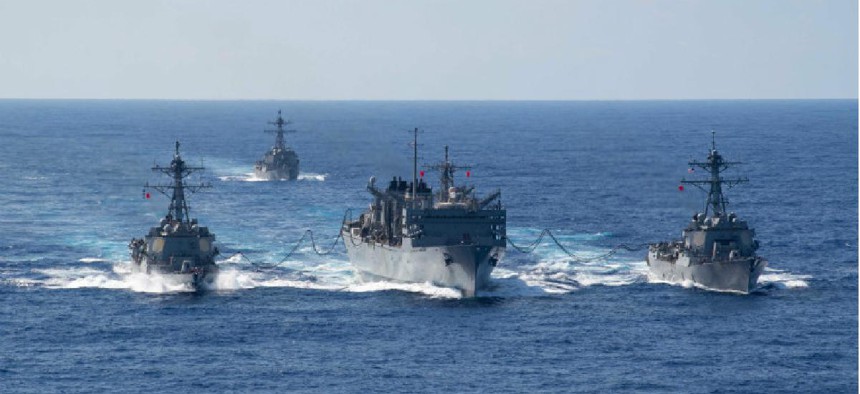DIU brings predictive maintenance to the Navy

The Pentagon's innovation arm looks to expand predictive maintenance technology to Navy ships.

U.S. Navy ships refuel at sea. (U.S. Navy photo)
The Defense Innovation Unit expects to take the artificial intelligence-fueled tech that keeps aircraft and ground vehicles running smoothly out to sea.
DIU Director of Strategic Engagement Mike Madsen said during remarks at the Sept. 12 Dell Technologies Forum on Real Transformation that the organization was discussing expanding its predictive maintenance efforts to the Navy.
"We're in discussions with the Navy right now, very advanced discussions," with senior leadership and expect to award a contract in fiscal 2020, Madsen told FCW following the event. DIU, which can award other transaction authorities, is also working on predictive maintenance across the Air Force and with the Army's legacy Bradley Fighting Vehicle fleet.
Predictive maintenance is one of DIU's several "transformative projects" that it hopes to scale to other platforms across the Defense Department and services. Along with the predictive maintenance expansion in 2020, DIU plans to take a deeper look at why certain programs failed to crossover into programs of record.
"One of the things we're going to start looking at is how do we smooth out the path to transition to a lot of these successful prototypes we've produced and gone on to maybe a low-rate production. How do we smooth out that transition to programs of record or a one-time buy?" Madsen said.
Since its founding, DIU has 57 overall projects and 25 that are complete. Eight of these completed projects have transitioned to programs of record, 11 are eligible to transition and six were concluded.
Madsen said it was okay that those six failed to thrive at DOD, "because if we were transitioning 100%, we wouldn't be trying hard enough, we wouldn't be taking enough risk."
Madsen named budget issues as an impediment, saying DOD customers not having the funds or mistiming projects with budget process can delay tech advancement.
"That's problematic for us from a tech perspective because [with] technology, there's a shelf-life," he said, "So if we have to wait for a budget cycle, that technology is already last generation."



